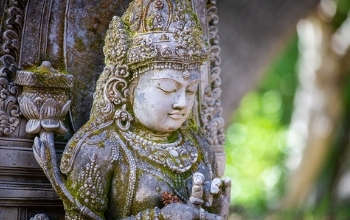Wisdom is not knowing but being. The Christian mystics instructed seekers to enter the Cloud of Unknowing with a trusting heart. The wise heart is not one that understands everything—it is the heart that can tolerate the truth of not knowing. Wisdom comes alive in the presence of the mystery, when the heart is open, sensitive, wholly receptive. Out of this simple presence, empathy, love, responsiveness, and other good things are born.
My teacher Ajahn Chah would often respond to people’s questions, plans, and ideas with a smile and say, “Mai neh.” The phrase means, “It is uncertain, isn’t it?” He understood the wisdom of uncertainty, the truth of change, and was comfortable in their midst. The truth is, we don’t know what will happen tomorrow.
There is a natural pleasure when we speak with someone who doesn’t know everything, who is open-minded, eager to listen. There is a delightful presence, receptiveness, and humility in such a mind. The Third Zen Patriarch puts it this way: “If you wish to know the truth, only cease to cherish opinions.” In the oldest of Buddhist texts, the Sutta Nipata, the Buddha speaks of this, ending with a humorous poke at those who hold opinions: “Seeing misery in views and opinions, without adopting any, I found inner peace and freedom. One who is free does not hold to views or dispute opinions. For a sage there is no higher, lower, nor equal, no places in which the mind can stick. But those who grasp after views and opinions only wander about the world annoying people.”
For a long time I didn’t understand this. After I had practiced in the monastery and began to offer retreats, I had many ideas. Much of my initial focus was teaching people Buddhist principles through which they could overcome greed, hatred, and delusion and develop mindfulness and understanding. I wanted people to understand their patterns of grasping, to rid themselves of greed, anger, hatred, and confusion, and I thought such insight would bring about transformation. As I matured, I began to see that it is much simpler than this.
Underneath all the wanting and grasping, underneath the need to understand is what we have called “the body of fear.” At the root of suffering is a small heart, frightened to be here, afraid to trust the river of change, to let go in this changing world. This small unopened heart grasps and needs and struggles to control what is unpredictable and unpossessable. But we can never know what will happen. With wisdom we allow this not knowing to become a form of trust.
Wisdom is not information, but an abiding presence, an intuitive, sensing opening of the body and heart. In wisdom the body of fear drops away and our heart comes to rest.






